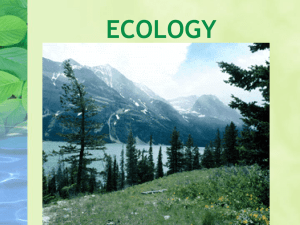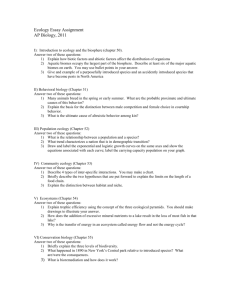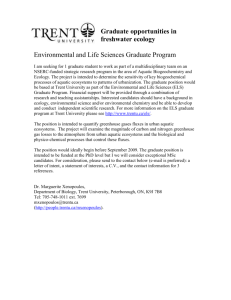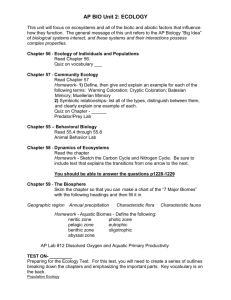Course Form
advertisement
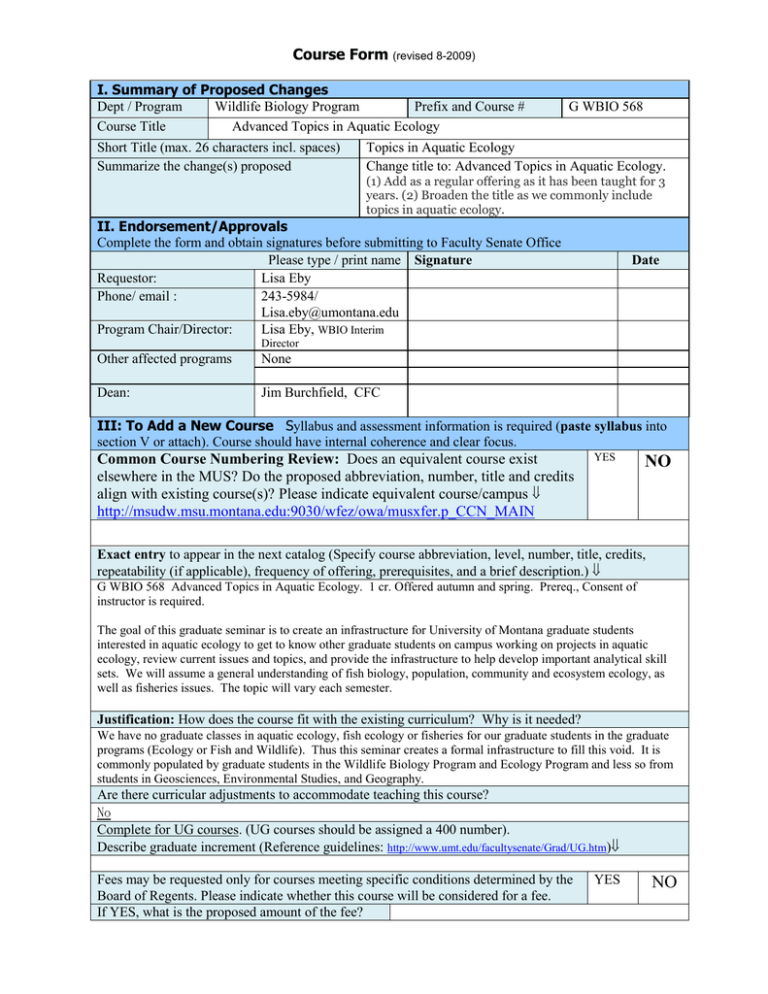
Course Form (revised 8-2009) I. Summary of Proposed Changes Dept / Program Wildlife Biology Program Prefix and Course # Course Title Advanced Topics in Aquatic Ecology Short Title (max. 26 characters incl. spaces) Summarize the change(s) proposed G WBIO 568 Topics in Aquatic Ecology Change title to: Advanced Topics in Aquatic Ecology. (1) Add as a regular offering as it has been taught for 3 years. (2) Broaden the title as we commonly include topics in aquatic ecology. II. Endorsement/Approvals Complete the form and obtain signatures before submitting to Faculty Senate Office Please type / print name Signature Requestor: Lisa Eby Phone/ email : 243-5984/ Lisa.eby@umontana.edu Program Chair/Director: Lisa Eby, WBIO Interim Date Director Other affected programs None Dean: Jim Burchfield, CFC III: To Add a New Course Syllabus and assessment information is required (paste syllabus into section V or attach). Course should have internal coherence and clear focus. Common Course Numbering Review: Does an equivalent course exist elsewhere in the MUS? Do the proposed abbreviation, number, title and credits align with existing course(s)? Please indicate equivalent course/campus http://msudw.msu.montana.edu:9030/wfez/owa/musxfer.p_CCN_MAIN YES NO Exact entry to appear in the next catalog (Specify course abbreviation, level, number, title, credits, repeatability (if applicable), frequency of offering, prerequisites, and a brief description.) G WBIO 568 Advanced Topics in Aquatic Ecology. 1 cr. Offered autumn and spring. Prereq., Consent of instructor is required. The goal of this graduate seminar is to create an infrastructure for University of Montana graduate students interested in aquatic ecology to get to know other graduate students on campus working on projects in aquatic ecology, review current issues and topics, and provide the infrastructure to help develop important analytical skill sets. We will assume a general understanding of fish biology, population, community and ecosystem ecology, as well as fisheries issues. The topic will vary each semester. Justification: How does the course fit with the existing curriculum? Why is it needed? We have no graduate classes in aquatic ecology, fish ecology or fisheries for our graduate students in the graduate programs (Ecology or Fish and Wildlife). Thus this seminar creates a formal infrastructure to fill this void. It is commonly populated by graduate students in the Wildlife Biology Program and Ecology Program and less so from students in Geosciences, Environmental Studies, and Geography. Are there curricular adjustments to accommodate teaching this course? No Complete for UG courses. (UG courses should be assigned a 400 number). Describe graduate increment (Reference guidelines: http://www.umt.edu/facultysenate/Grad/UG.htm) Fees may be requested only for courses meeting specific conditions determined by the Board of Regents. Please indicate whether this course will be considered for a fee. If YES, what is the proposed amount of the fee? YES NO Justification: IV. To Delete or Change an Existing Course – check X all that apply Deletion Title Course Number Change From: Level U, UG, G To: Description Change Change in Credits From: To: Repeatability Cross Listing (primary program initiates form) Prerequisites Is there a fee associated with the course? 1. Current course information at it appears in catalog 2. Full and exact entry (as proposed) (http://www.umt.edu/catalog) From: To: 3. If cross-listed course: secondary program & course number 4. Is this a course with MUS Common Course Numbering? If yes, then will this change eliminate the course’s common course status? Please explain below. No Have you reviewed the graduate increment 5. Graduate increment if level of course is changed guidelines? Please check (X) space provided. to UG. Reference guidelines at: http://www.umt.edu/facultysenate/Grad/UG.htm (syllabus required in section V) 6. Other programs affected by the change None 7. Justification for proposed change V. Syllabus/Assessment Information Required for new courses and course change from U to UG. Paste syllabus in field below or attach and send digital copy with form. Topics in Fish Ecology Instructor: Lisa Eby, lisa.eby@umontana.edu, 243-5984 Meeting Place: BRL 102 Meeting time: 11:00-12:45 Thursdays Office Hours are by appointment The goal of this graduate seminar is to create an infrastructure for University of Montana graduate students interested in aquatic ecology to get to know other graduate students on campus working on projects in aquatic ecology, review current issues and topics, and provide the infrastructure to help develop important analytical skill sets. We will assume a general understanding of fish biology, population, community and ecosystem ecology, as well as fisheries issues. The topic will vary each semester. Consent of instructor required. Students are required to read the literature associated with the course, review material on a topic, and present this to the rest of the class. This often includes an annotated bibliography or worked analytical examples. We have run this seminar several times, previous topics included: (1) Global Change and inland trout: we reviewed what we know about climate change predictions for the Rocky Mountain region, and explored the potential responses of aquatic community responses while evaluating the evidence (empirical and modeling predictions) for specific changes to species energetic budget, ecology, life history, distributions, and evolutionary trajectories. We covered a different component each week. Students assigned to each week provided an annotated bibliography and two focal papers for discussion. We reviewed the state of the knowledge and discussed where we needed to go from here. (2) Analysis and interpretation of fisheries data: we reviewed a relatively new book “Analysis and interpretation of freshwater fisheries data”. Each week we reviewed a type of sampling, data collection and typical analysis of this type of data. Student were charged with presenting the material, working out the problems with a statistical package of their choice to discuss areas where they struggled, important issues in consideration in study design and analyses of particular types of data. We covered sampling and experimental design, age and growth, calculating mortality, markrecapture for population estimation and movement, radiotelemetry for habitat use and movement, community indices and provided a comparision of approaches, habitat assessment (types and current tools), as well as techniques for watershed assessment. (3) Aquatic Restoration: currently we are reviewing the Blackfoot Basin Restoration Plan. We will review some of the basics of aquatic restoration and link it to what is proposed or has happened in the Blackfoot River Basin. What is restoration? How are we setting targets (species or systems, structure or function)? How are we prioritizing restoration sites? How are we incorporating threats? How are we evaluating success? Are we using the proper outcomes? What types of restoration projects are being monitored and are they successful? What is missing from our approach? Are we learning the right things from our assessment, how could we learn more? What is the role of adaptive management framework in these large watershed plans? Can it be done? VI Department Summary (Required if several forms are submitted) In a separate document list course number, title, and proposed change for all proposals. VII Copies and Electronic Submission. After approval, submit original, one copy, summary of proposals and electronic file to the Faculty Senate Office, UH 221, camie.foos@mso.umt.edu.
